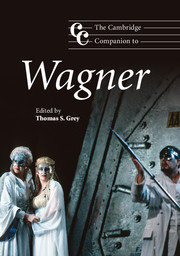Book contents
- Frontmatter
- PART I Biographical and historical contexts
- 1 Wagner lives: issues in autobiography
- 2 Meister Richard's apprenticeship: the early operas (1833–1840)
- 3 To the Dresden barricades: the genesis of Wagner's political ideas
- PART II Opera, music, drama
- PART III Ideas and ideology in the Gesamtkunstwerk
- PART IV After Wagner: influence and interpretation
- Notes
- Select bibliography
- Index
2 - Meister Richard's apprenticeship: the early operas (1833–1840)
from PART I - Biographical and historical contexts
Published online by Cambridge University Press: 28 September 2011
- Frontmatter
- PART I Biographical and historical contexts
- 1 Wagner lives: issues in autobiography
- 2 Meister Richard's apprenticeship: the early operas (1833–1840)
- 3 To the Dresden barricades: the genesis of Wagner's political ideas
- PART II Opera, music, drama
- PART III Ideas and ideology in the Gesamtkunstwerk
- PART IV After Wagner: influence and interpretation
- Notes
- Select bibliography
- Index
Summary
Richard Wagner's early approach to an operatic career was oblique, yet inexorable. As a boy he was raised in a gesamtkünstlerisch environment, so to speak – an educated bourgeois milieu that cultivated the arts both domestically and professionally. His stepfather, Ludwig Geyer, was a painter as well as an actor; among his sisters were an accomplished actress (the eldest, Rosalie) and a singer (Klara); his brother Albert was a tenor and sometime opera director; his uncle Adolf Wagner was something of a scholar and critic who had been on friendly terms with Ludwig Tieck and E.T.A. Hoffmann, though he looked less kindly on the performing arts; and the father he never knew and whose paternity remained a large question mark, Carl Friedrich Wagner, had been for his part an amateur actor and devoted theater-goer until his death in 1814. Music, in this environment, existed as the handmaiden to drama and poetry. The commingling of spoken theater and opera in the Wagner family circle was altogether characteristic of German theatrical culture in this period, similar to England and to some extent France in this respect; only the Italian repertory represented what the later Wagner might have called “absolute” opera.
- Type
- Chapter
- Information
- The Cambridge Companion to Wagner , pp. 18 - 46Publisher: Cambridge University PressPrint publication year: 2008

